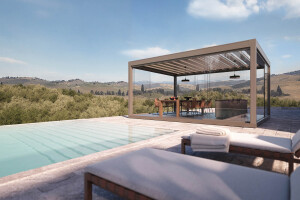Loer Architecten’s Biobased Barn House Schelfhorst Merges Vernacular Form with Low-Impact Innovation. Located in Paterswolde, the Netherlands, the timber-framed residence reinterprets traditional Dutch barn architecture through a biobased lens.
As part of the ecological redevelopment of a former campsite into a low-density residential zone in Paterswolde, Biobased Barn House Schelfhorst by Loer Architecten offers a refined architectural response to contemporary sustainability challenges. The design revisits the traditional Dutch barn typology, applying biobased construction techniques and material strategies to create a high-performance dwelling that is rooted in its rural context.

The house comprises two volumes, a main residence and a secondary structure containing a garage and workspace, arranged in a classic farmyard formation. This configuration draws on the spatial logic of regional agricultural ensembles, reinforcing local identity while introducing calibrated spatial transitions between interior and exterior, public and private.
Constructed using a timber-frame system, the building fabric integrates renewable materials throughout. The structural framework, exterior cladding, and window frames are all fabricated from sustainably sourced wood, contributing to carbon sequestration and a significantly reduced embodied footprint. The façades are articulated with extended roof overhangs, which provide passive shading during summer months and enable solar gain in winter, enhancing the home’s seasonal energy balance.
The project is sited within a semi-open natural landscape that functions as an ecological buffer zone to nearby nature reserves, including the Elsburger Onlanden. Instead of conventional fencing or plot demarcations, the landscape design employs soft boundaries such as hedges, native planting, and tree lines to promote biodiversity, permeability, and ecological continuity.

Interior spaces are defined by a balance of mass and openness, inspired in part by Japanese architectural principles. Strategic window placement ensures visual connection to the surrounding landscape while maintaining thermal performance and occupant privacy. The envelope is highly insulated, and detailing throughout prioritizes material longevity and low maintenance, ensuring long-term environmental and economic resilience.
Commissioned by Beauvast and realized in collaboration with building consultancy Tectnique, the Biobased Barn House Schelfhorst represents an architectural model for climate-conscious rural living. By combining vernacular references with high-performance, biobased construction, Loer Architecten delivers a residence that is both spatially refined and environmentally calibrated, a quiet yet decisive step forward in regenerative design.

Commissioned by developer Beauvast, the architecture is designed by Loer Architecten, supported by Tectnique.

























